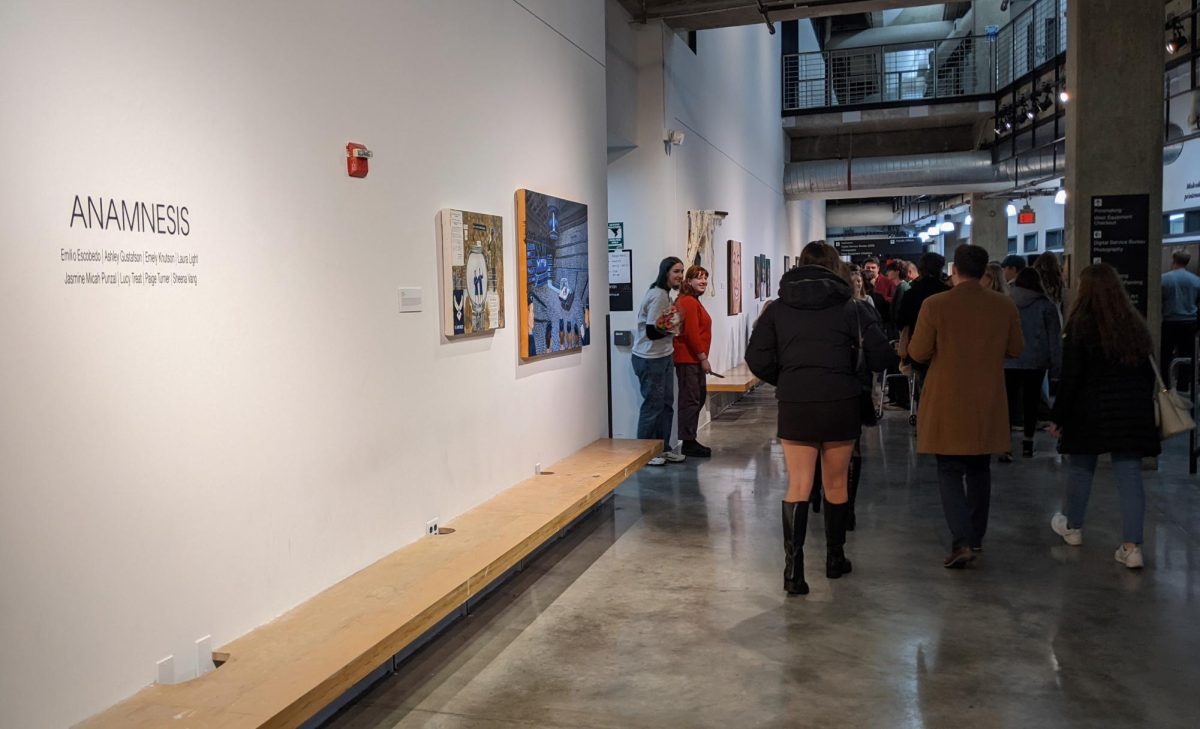WBy Michelle Horton
 e find ourselves in the second war with Iraq, in the second war with Saddam Hussein, waged by the second president named George Bush. One would think, then, a play about the Gulf War might lend some insight into these choleric times. The latest Outward Spiral Theatre Company production, “In the Heart of America,” deals with the topic of a homosexual romance during the Gulf War. The set consists of one room, constructed of corrugated steel, with two pieces of furniture: a bed and what appears to be a paper lantern bearing red and white stripes with a biohazard-type logo. We are in the midst of the Gulf War, in the heat and the sand and the chaos and the passion. Enter Craver (played by Nick Condon), the Kentucky hick bound up in the love affair that will change his life forever.
e find ourselves in the second war with Iraq, in the second war with Saddam Hussein, waged by the second president named George Bush. One would think, then, a play about the Gulf War might lend some insight into these choleric times. The latest Outward Spiral Theatre Company production, “In the Heart of America,” deals with the topic of a homosexual romance during the Gulf War. The set consists of one room, constructed of corrugated steel, with two pieces of furniture: a bed and what appears to be a paper lantern bearing red and white stripes with a biohazard-type logo. We are in the midst of the Gulf War, in the heat and the sand and the chaos and the passion. Enter Craver (played by Nick Condon), the Kentucky hick bound up in the love affair that will change his life forever.
The play begins by staging repeatedly the walk taken by Craver to the body of his Palestinian-American boyfriend Remzi (David Joseph Regelmann) lying in the sand after being shot to death by an Iraqi soldier. We get other clues to what really lies in the heart of the Gulf War, such as the repeated pronunciation of Saddam as “Sodom,” calisthenics, and the talk of bombs and missiles as more erotic and explosive than two men sharing their first homosexual experience. There is hope at the beginning of the play that this could at least take us in the direction of “Kiss of the Spiderwoman,” but this is not to be.
Throughout “In the Heart of America” we encounter Remzi’s sister, Fairouz (Aamera Siddiqui), in the present moment, on a wild goose chase looking for her brother, not knowing if he is alive or dead. She runs around frantically trying to find out the truth of Remzi’s whereabouts, and finally befriends Craver in order to do so. Accompanying her is the ghost of Lue Ming (Katie Leo), a woman killed in the My Lai massacre during the Vietnam War, who does not seem to understand the logic of the passage of time and the rational explanations for differences between wars. She is also searching for a man named Boxler (Galway McCullough), who is involved with Remzi and Craver in the Gulf War, but who was also responsible for killing her, her daughter and scores of others in the massacre.
While “In the Heart of America” has elements of interest, it is eventually disappointing. There are certain themes in the plot that could have made the play in some way memorable and not feel like a waste of time, such as notions of ever-present war. For instance, Boxler and Lue Ming both constantly confuse which war happened when, conflating the Korean War, the Vietnam War, the Gulf War, the invasion of the Philippines, the invasion of Panama and so on. This confusion underscores the fact that the United States has constantly been fighting to protect its interests, and has permanently changed the realities and memories of most of the ghosts of the Third World. This point alone, if properly written into the script by Naomi Wallace and executed by director Jeff Hall-Flavin, could have made for a fabulously interesting theatrical engagement.
Although the direction and script seem to be lacking in a few respects, the acting does come through. For instance, Regelmann’s Remzi is both memorable and on point, not to mention cute. Leo’s Lue Ming probably has the strongest performance, as she is centered, poised, clear and effective. While Condon’s Craver might leave some wanting for more, it’s hard to imagine him as anything other than a Kentucky redneck.
Wallace’s repeated collapsing of the erotic into the violent, and the use of identities which we cannot control (sexuality, race, class, gender) for the ideological purposes of waging war, only serves to make this work perpetuate the very conditions in which we find ourselves. There is nothing new in making a spectacle of the convergence of the fundamentally visceral and corporal aspects of war with masculine sexuality. The biological components of sexuality and fighting have many similarities. Unfortunately, “In the Heart of America” does not offer anything to point to a way out, or any new perspective on war in spite of its complete immersion in the crisis.
During the intermission, a woman in the audience visiting from New York, visibly upset, commented to some people she was just dying to put on the play upon returning. She kept exclaiming about the relevance and the timeliness of the production. Timely? Sure, if you’re looking for a spell of mindless entertainment dressed up to make you feel politically active and emotionally charged while you sit on your duff.
“In the Heart of America” plays through April 12 at the Loring Playhouse,
(612) 486-5757
Please send comments to [email protected]







